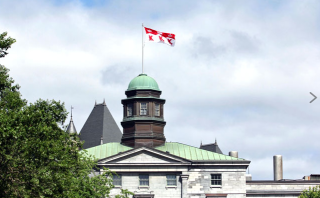As part of its ongoing commitment to fighting climate change, McGill University's result-oriented strategy has accelerated the effective decarbonization of its investment, and further reduced its exposure to large users of oil, gas, and coal, as well as fossil fuel producers. By taking a holistic approach that looks beyond the traditional carbon-intensive energy sector, the University has achieved a nearly 53 per cent absolute reduction in the carbon footprint of its two-billion-dollar endowment portfolio in just two years.
This is one of the many accomplishments included in the University's 2021 Socially Responsible Investing (SRI) annual report issued this month by McGill's Investment Committee. "McGill University's bold strategy has reduced the carbon emissions of its endowment investments by 78,000 tons annually, which is equivalent to taking approximately 16,800 gasoline-powered passenger vehicles off the road," said Sophie Leblanc, Chief Investment Officer & Treasurer at McGill University. "This is about four times more than what could have been accomplished by divesting from top oil and gas reserve owners alone."
Moreover, the University has reached its target of increasing Impact Investments to five per cent, including a commitment of US $25 million in a Global Renewable Energy Fund. In total, McGill has engaged more than $100 million in investments to help transition to a zero-emission economy, covering everything from renewables to electrified transport, carbon capture, and sustainable solutions. McGill has also increased its investments in fossil-fuel-free funds to $10.8 million - more than double the initial commitment made five years ago.
Last week, the C.D. Howe Institute report Ranking Canada's Universities on Their Climate Change and Endowment Activities1, placed McGill in the top five of 16 universities who signed the Climate Charter for Canadian Universities and have "made commitments to manage their assets while taking climate change into consideration." The report singled out McGill as the only signatory to include climate-related targets directly in its investment policy.
The report observes that although divestment "can help to reduce the carbon footprint of a portfolio, it does not necessarily help to decarbonize the economy - a holistic approach is needed with consideration given to how each asset class and sector contributes to the overall investment strategy."
Today, over 99 per cent of McGill's assets are managed by fund managers who adhere to an environmental, social, and governance policy or are signatories of the United Nation Principles for Responsible Investment.
McGill's commitment to sustainability goes back several decades. As evidenced by the sustainability statements it has signed, the University is committed to helping shape a future in which humans can thrive in a way that respects the planet.
"Adopting a more carbon-conscious investment approach complements McGill's far-reaching climate change and sustainability goals as well as efforts to achieve carbon neutrality across the University's operations", concluded Principal Suzanne Fortier.
About McGill University
Founded in Montreal, Quebec, in 1821, McGill University is Canada's top ranked medical doctoral university. McGill is consistently ranked as one of the top universities, both nationally and internationally. It is a world-renowned institution of higher learning with research activities spanning three campuses, 11 faculties, 13 professional schools, 300 programs of study and over 39,000 students, including more than 10,400 graduate students. McGill attracts students from over 150 countries around the world, its 12,000 international students making up 30% of the student body. Over half of McGill students claim a first language other than English, including approximately 20% of our students who say French is their mother tongue.







